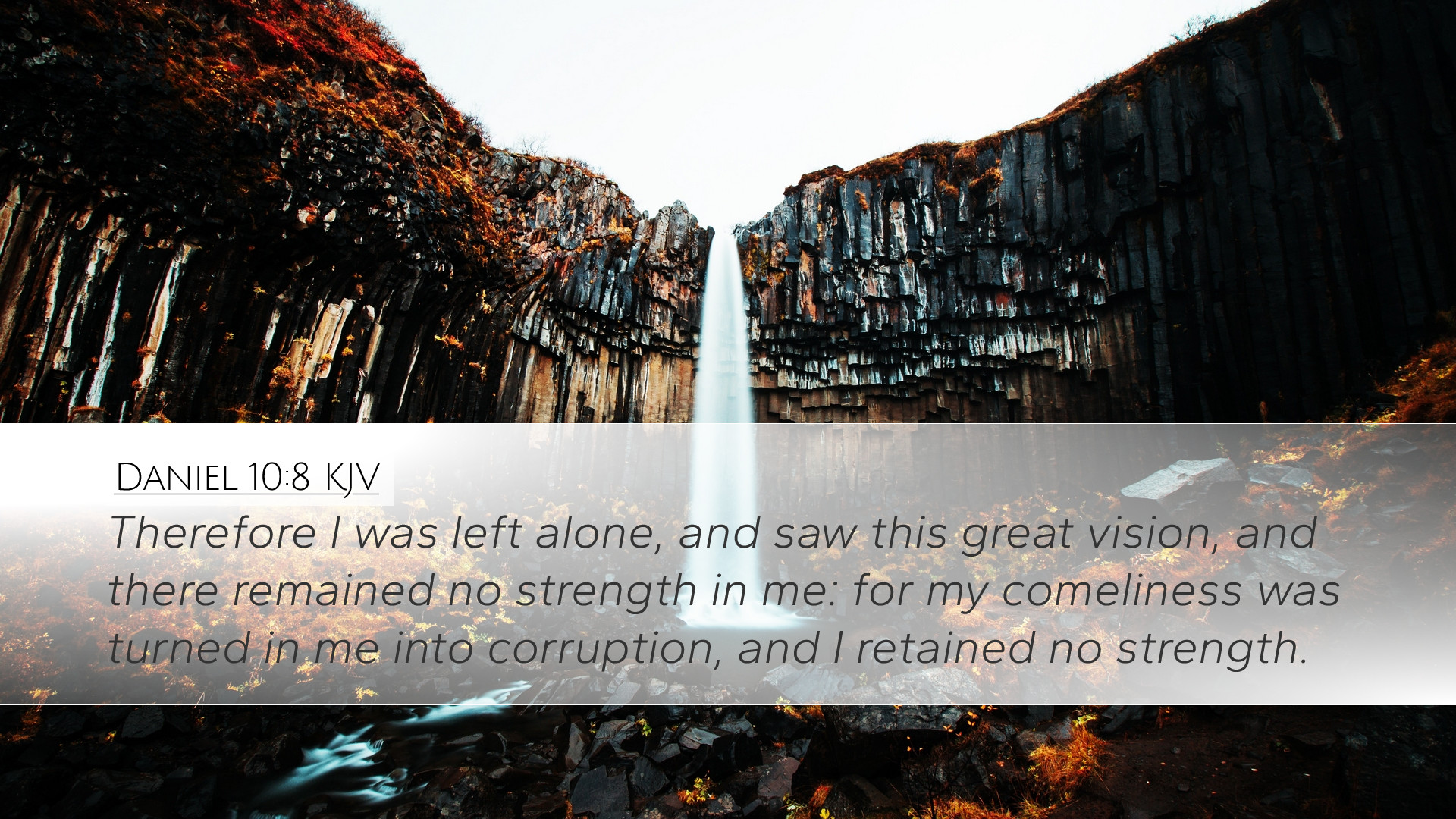Old Testament
Genesis Exodus Leviticus Numbers Deuteronomy Joshua Judges Ruth 1 Samuel 2 Samuel 1 Kings 2 Kings 1 Chronicles 2 Chronicles Ezra Nehemiah Esther Job Psalms Proverbs Ecclesiastes Song of Solomon Isaiah Jeremiah Lamentations Ezekiel Daniel Hosea Joel Amos Obadiah Jonah Micah Nahum Habakkuk Zephaniah Haggai Zechariah MalachiDaniel 10:8
Daniel 10:8 KJV
Therefore I was left alone, and saw this great vision, and there remained no strength in me: for my comeliness was turned in me into corruption, and I retained no strength.
Daniel 10:8 Bible Commentary
Commentary on Daniel 10:8
In the book of Daniel, chapter 10, verse 8, we encounter a pivotal moment that reveals the themes of spiritual struggle, prayer, and divine intervention. This verse states: "Therefore I was left alone, and saw this great vision, and there remained no strength in me: for my comeliness was turned in me into corruption, and I retained no strength." Through various public domain commentaries, we can discern significant insights that can deepen our understanding of this text.
Contextual Background
Daniel 10 is part of a larger narrative that recounts Daniel's experiences and visions concerning the future of his people. This chapter serves as prologue to the final revelations about the end times, showcasing both the physical and spiritual tension that Daniel faced during his prophetic ministry.
Historical Setting
Matthew Henry elucidates the context by emphasizing the timeframe in which Daniel was writing. The vision occurs in the third year of Cyrus's reign, amidst the returning exiles to Jerusalem, highlighting the distress and uncertainty faced by the Jewish people. This period marked a significant transition for the Israelites, as they faced opposition and spiritual challenges in rebuilding their nation.
The Vision and Its Impact
To fully grasp verse 8, it is imperative to delve into the preceding verses. Daniel is described as having received a profound vision that affected him deeply. Adam Clarke remarks that this vision's magnitude left Daniel in a state of desolation, underscoring the seriousness of his prophetic calling.
Personal Fallout
- Isolation: Daniel states, "I was left alone." This solitude signifies the burden of prophetic insight, as few understood the magnitude of the revelations he received.
- Physical Weakness: The phrase "there remained no strength in me" indicates a physical and spiritual depletion. Commentators like Albert Barnes stress how the weight of divine encounters often leaves prophets overwhelmed.
- Spiritual Transformation: Daniel’s declaration that "my comeliness was turned in me into corruption" reflects a deep awareness of human frailty in the presence of divine holiness. It serves as a powerful reminder of the transformative encounters one has with God.
Theological Insights
This verse encapsulates not only Daniel’s physical and emotional state but also points toward significant theological themes worth exploring:
1. The Nature of Divine Encounter
Daniel’s experience serves as a testament to the holiness of God and man's unworthiness. Matthew Henry notes that a true encounter with God reveals the contrast between human glory and divine majesty. The vision act as a humbling experience, leading to a profound understanding of one's limitations.
2. The Struggle of the Prophet
Daniel’s struggle mirrors the challenges faced by many leaders and believers in confronting the spiritual battles of their times. Albert Barnes highlights that the weight of God’s revelatory truths can lead to feelings of inadequacy, compelling the prophet to seek more from God, despite his weakness.
3. The Call to Persevere in Prayer
Despite his distress, Daniel’s commitment to prayer reflects a deeply rooted dependency on God. Clarke emphasizes the importance of continued prayer in times of spiritual warfare, drawing attention to the necessity of perseverance in seeking divine assistance amidst overwhelming circumstances.
Lessons for Today
Daniel 10:8 offers several lessons for pastors, students, and theologians:
- Awareness of Divine Holiness: Encountering God leads to a greater understanding of our own limitations. This should evoke a spirit of humility and reliance on God's grace.
- The Value of Solitude: In moments of spiritual heaviness, like Daniel, we may need to embrace solitude to process and respond to God’s revelations.
- Continued Prayer and Perseverance: Daniel’s example encourages believers to remain steadfast in prayer, trusting that God is at work even when we feel weak.
Conclusion
In conclusion, Daniel 10:8 serves as a profound reflection on the call to prophetic ministry, the struggle of the believer, and the majesty of God. It reveals the complexities involved in receiving and responding to divine revelations. Through this contemplation, we are encouraged to remain humble, persistent in prayer, and reliant on God’s strength in our own spiritual journeys.


